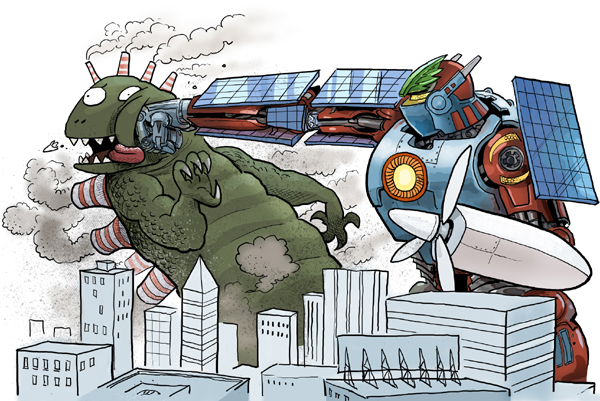 |
|
Luo Jie/China Daily |
Economic growth leads to huge drops in deadly indoor air contamination
In the past three decades, China's development has pulled a staggering 680 million people out of poverty. It did so through a dramatic increase in access to modern energy, mostly powered by coal, which has led to terrible outdoor air pollution in Chinese cities, not to mention making China the world's premier carbon dioxide emitter. That is why many environmentalists say that China's rise has come at substantial environmental costs.
It is true that China now suffers from more outdoor air pollution than in its pre-boom days, but the same happened in all other industrializing countries-air pollution in London reached a peak in 1890.
It is also important to point out that while outdoor air pollution in China has definitely increased since 1990, the overall impact of air pollution has declined. This is because indoor air pollution is often wrongly ignored. Indoor air pollution comes from burning charcoal, twigs and dung inside the house, which creates terrible pollution and kills more than 1 million people in China each year.
Overall, the world's largest study conducted by the World Health Organization estimates that for China, deaths from outdoor air pollution have increased from 900,000 to 1.2 million a year from 1990 to 2010. But decreasing poverty has allowed many more to avoid indoor air pollution, which has dropped faster, from more than 1.6 million deaths to 1 million deaths in 2010. Almost 2.6 million people died from air pollution in China in 1990, but the number declined to 2.3 million in 2010 despite an 18 percent increase in the population. In total, fewer people now die from air pollution in China because of less poverty.
With outdoor air pollution rampant in Beijing that may seem surprising, but we forget that indoor air pollution has always been more important. In 1900, almost all pollution deaths in the world were related to indoor air pollution, and the individual risk of dying from air pollution was more than five-fold higher than it is today.
In short, indoor air pollution has declined, because the increasing number of people coming out of poverty can now afford to cook using modern energy. Yes, outdoor air pollution has increased-but that only confirms a long-standing finding that many environmental indicators tend to first get worse, then better, with economic development.
Essentially, China, just like the United Kingdom before it, has traded off economic development for some additional outdoor air pollution. This prosperity buys food, education and medical services, while electricity and gas help eradicate indoor air pollution. The familiar pattern is that once a country obtains a certain level of wealth, it can also afford to protect more nature and reduce pollution. About 80 percent of China's coal-fired power plants now have pollution-reducing scrubbers, and sulfur emissions have been declining since 2006.
To put numbers to this, the World Bank estimates that China's total annual air-pollution cost-based on what Chinese themselves indicate they are willing to pay to reduce their risk of dying-could be as high as 4 percent of GDP. Yet the Chinese trade-off has been phenomenally beneficial. In 1982, the average Chinese earned $585 (438 euros) a year; the figure had increased to $7,958 by last year. The annual per capita environmental cost is $318. So, not surprisingly, most other developing countries would gratefully seize the opportunity to replicate China's growth pattern-including its pollution.
Of course, China can do more to reduce air pollution. It is estimated that meeting the WHO's interim standards could reduce damages by $80 per capita. But that pales in comparison to the $600 increase in per capita income just in 2013.
Another environmental concern gets a lot more global attention these days. Global warming is a real problem, though much smaller than indoor air pollution. The WHO estimates that 4.3 million people die from indoor air pollution whereas global warming causes perhaps 141,000 deaths a year.
Crucially, reducing CO2 is going to be much harder because it is a byproduct of producing the cheap energy that makes the world go round. Environmentalists and Western politicians demand that China invest a lot more in renewable energies. But this appears hypocritical, because the West gets only 0.8 percent of its energy from solar and wind. Moreover, these technologies receive annual subsidies worth $60 billion, and China can definitely find better uses for that sort of money.
We need a smarter approach to deal with global warming. Here the US experience can show the way. Hydraulic fracturing (or fracking) has made natural gas much cheaper, leading to a dramatic switch in electricity production away from coal. Because gas emits half the CO2 per kilowatt/hour, it has enabled the US to cut its emissions more than what all the well-intentioned solar panels and wind turbines in the world have achieved. The domestic production of gas gives the US greater energy independence. And cheaper gas has probably saved consumers $100 billion and increased GDP by $283 billion a year.
With fracking, China could similarly achieve greater GDP growth and more energy independence, and reduce its CO2 emissions to a greater extent than through expensive and unreliable solar and wind power.
To fix climate in the long term, we need to invest much more in research and development of green energy. This will help reduce the price of green energy compared with fossil fuels over the next decades to eventually allow all to enjoy a good life without the adverse effects of both indoor and outdoor air pollution.
The author is president of the Copenhagen Consensus Center. The views do not necessarily reflect those of China Daily.
